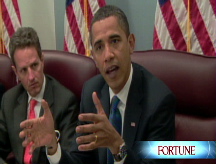Obama: Give me the money
Tuesday, January 13, 2009
Various members in Congress have outwardly stated how upset they are concerning how the Treasury Department spent the first allotment of $350 billion dollars. So most likely, the only person now that convince congress on how the next $350 billion dollars will be spent will be Barack Obama. He appears to be stepping into office with a full plate in front of him. Someone with his ability to delegate, manage and make correct decisions is what is desperitely needed now. Accountability is key, and Barack Obama seems to be the person who can make the accountability happen. In a special report on CNNMoney.com, Colin Barr states in a report the urgency of getting the funds released in a timely manner. The special report on the #1 issue is immediately below.
Top aide to president-elect tells Congress it's urgent that $350 billion in remaining bailout funds be put to work. Bush makes formal request to lawmakers.
A top Obama economic aide laid out new priorities for the use of the remaining balance under the Treasury Department's $700 billion Troubled Asset Relief Program, or TARP. In a letter addressed to the leadership of the Senate and House of Representatives, the Obama team strikes a note of urgency about winning the release of the funds.
"President-elect Obama believes it is not too late to change course, but it will be if we don't take dramatic action as soon as possible," says the letter, written by Lawrence Summers, director-designate of the National Economic Council.
The appeal to Congress comes as the incoming administration seeks to respond to a sharp slowdown in the economy and to win over congressional critics of federal bailout efforts.
The Summers letter - addressed to House Speaker Nancy Pelosi and Minority Leader John Boehner, and Senate Majority Leader Harry Reid and Minority Leader Mitch McConnell - said Obama aims to:
- Use "our full arsenal of tools" to get credit flowing to consumers and businesses;
- Reform the oversight of the TARP program and other responses to financial crisis;
- Use "smart, aggressive policies" to reduce foreclosures;
- Toughen conditions for recipients of bailout money; and
- Try to attract private capital and speed the end of bailout plans.
Under the bailout legislation approved by Congress in October, unless Congress passes a resolution rejecting the request within 15 days, Treasury can begin tapping the funds.
The money won't be available until the Obama administration is in office. Inauguration Day is Jan. 20.
Obama, meeting with reporters, explained that he is seeking the funding because the financial system remains "fragile."
"I felt that it would be irresponsible for me, with the first $350 billion already spent, to enter into the administration without any potential ammunition, should there be some sort of emergency or weakening of the financial systems," Obama said.
Lawmakers on both sides of the aisle have expressed unhappiness with the way Treasury Secretary Henry Paulson has used the first $350 billion. They object to how Treasury made direct investments in banks with few strings attached and no process for tracking how the banks are using the money.
Leading Democrats in Congress have made clear that reducing foreclosures will be among their chief priorities for the use of the second half of TARP funds. On Friday, House Financial Services Chairman Barney Frank, D-Mass., introduced a bill that promises $50 billion of foreclosure relief and toughens terms on companies getting taxpayer money.
Obama is set to go to Capitol Hill Tuesday to meet with Senate Democrats and make his case for how he wants to spend the TARP funds, two Democratic sources told CNN.
For now, Democrats in Congress are trying to marshal votes to keep bailout critics from passing a measure that would prevent Congress from releasing the second half of the TARP funds.
Last week, Rep. Virginia Foxx, R-N.C., introduced a resolution opposing the release of the funds. Passage would require a majority vote. The House must vote on the measure within five days of the White House making a formal request to Congress, Foxx's spokesman Aaron Groen said.
Groen said he believes the Foxx measure will get substantial support, but he says whether it can get a two-thirds majority that would make it veto-proof is "a tough call."
"It may boil down to what happens with the Frank legislation," Groen said, referring to the bill Frank introduced Friday. Hearings on that bill are scheduled for this week.
"The best course of action, of course, is to convince enough members of the Senate to vote positively for the -- for the request," Bush said.
News that Obama was seeking the funds came just hours after Bush, speaking at his last regular White House press conference, said Obama hadn't made any request for the funds.
"I told him that if he felt he needed the $350 billion, I would be willing to ask for it," Bush said Monday.
Despite criticism of how the first half of the TARP money was deployed, Bush defended his administration's approach. He said he was concerned in the fall that the U.S. was headed for an economic meltdown worse than the Great Depression, but now he sees signs that "financial markets are beginning to thaw."
CNN's Dana Bash, Evan Glass and Briana Keilar contributed to this report.






0 comments:
Post a Comment